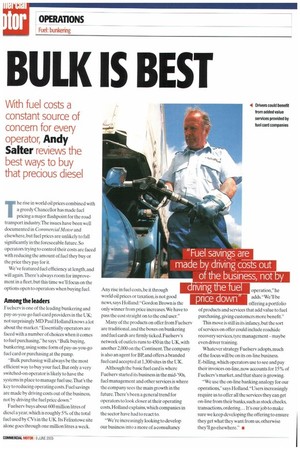BULK 1 S BEST
Page 62

If you've noticed an error in this article please click here to report it so we can fix it.
With fuel costs a constant source of concern for every
operator, Andy Salter reviews the
best ways to buy that precious diesel
The rise in world oil prices combined with a greedy Chancellor has made fuel pricing a major fiashpoint for the road transport industry. The issues have been well documented in Commercial Motor and elsewhere, but fuel prices are unlikely to fall significantly in the foreseeable future. So operators trying to control their costs are faced with reducing the amount of fuel they buy or the price they pay for it.
We've featured fuel efficiency at length, and will again.There's always room for improvement in a fleet, but this time we'll focus on the options open to operators when buying fuel.
Among the leaders 1. uelscry is one of the leading bunkering and pay-as-you-go fuel-card providers in the UK: not surprisingly MD Paul Holland knows a lot about the market. "Essentially operators are faced with a number of choices when it comes to fuel purchasing." he says. "Bulk buying, bunkering, using some form of pay-as-you-go fuel card or purchasing at the pump.
"Bulk purchasing will always be the most efficient way to buy your fuel. But only a very switched-on operator is likely to have the systems in place to manage fuel use.That's the key to reducing operating costs. Fuel savings are made by driving costs out of the business, not by driving the fuel price down."
Fuelserv buys about 600 million litres of diesel a year, which is roughly 5% of the total fuel used by CVs in the UK. Its Felixstowe site alone goes through one million litres a week. Any rise in fuel costs, be it through world oil prices or taxation, is not good news, says Holland: "Gordon Brown is the only winner from price increases. We have to pass the cost straight on to the end user."
Many of the products on offer from Fuelserv are traditional, and the boxes on bunkering and fuel cards are firmly ticked. Fuelserv's network of outlets runs to 450 in the UK, with another 2.000 on the Continent. The company is also an agent for BE and offers a branded fuel card accepted at 1,300 sites in the UK.
Although the basic fuel card is where Fuelserv started its business in the mid-'90s, fuel management and other services is where the company sees the main growth in the future.There's been a general trend for operators to look closer at their operating costs, Holland explains, which companies in the sector have had to react to.
"We're increasingly looking to develop our business into a more of a consultancy operation," he adds."We'll be offering a portfolio of products and services that add value to fuel purchasing, giving customers more benefit."
This move is still in its infancy, but the sort of services on offer could include roadside recovery services. tyre management maybe even driver training.
Whatever strategy Fuelserv adopts, much of the focus will be on its on-line business. E-billing.which operators use to see and pay their invoices on-line,now accounts for 15% of Fuelserv's market, and that share is growing.
"We use the on-line banking analogy for our operations," says Holland. "Users increasingly require us to offer all the services they can get on-line from their banks, such as stock checks, transactions, ordering... It's our job to make sure we keep developing the offering to ensure they get what they want from us, otherwise they'll go elsewhere."
price Gown






































































































































































































